|
|
Clara Wieck Schumann (Composer, Arranger) |
|
Born: September 13, 1819 - Leipzig, Germany
Died: May 20, 1896 - Franfurt, Germany |
|
Clara Josephine Wieck Schumann was a German musician, one of the leading pianists of the Romantic era, as well as a composer, and wife of composer Robert Schumann. |
|
Biography |
|
Clara Schumann was trained from the age of 5 with her father, the well-known piano pedagogue Friedrich Wieck. Prior to beginning her lessons, young Clara had only uttered her first words some time between 4 and 5 years old. In fact, she described herself as understanding as little as she spoke and as having disinterest in all that was passing around her, a condition that was not "entirely cured" - as she put it- until she was 8 years old. Clara Schumann's pattern of delayed speech and subsequent virtuosity is shared by other famous late-talkers such as fellow pianist Arthur Rubinstein, physicists Albert Einstein and Richard Feynman, and mathematician Julia Robinson among others.
Clara Schumann had a brilliant career as a pianist from the age of 13 up to her marriage. Her marriage to Schumann was opposed by her father. She continued to perform and compose after the marriage even as she raised seven children. An eighth child died in infancy. In the various tours on which she accompanied her husband, she extended her own reputation further than the outskirts of Germany, and it was thanks to her efforts that his compositions became generally known in Europe. Johannes Brahms, at age 20, met the couple in 1853 and his friendship with Clara Schumann lasted until her death. J. Brahms helped Clara Schumann through the illness of her husband with a caring that bordered on love. Later that year, she also met violinist Joseph Joachim who became one of her frequent performance partners. Clara Schumann is credited with refining the tastes of audiences through her presentation of works by earlier composers including those of Bach, Mozart, and Beethoven as well as those of Robert Schumann and J. Brahms.
Clara Schumann often took charge of the finances and general house running due to Robert Schumann's inclination to depression and instability. Part of her responsibility included making money, which she did performing - often Robert Schumann's music. She continued to play not only for the financial stability, but because she wished not to be forgotten as a pianist. She had grown up performing and desired to continue performing. Robert Schumann, while admiring her talent, wanted a traditional wife to bear children and make a happy home, which in his eyes and the eyes of society were in direct conflict with the life of a performer. Furthermore, while she loved touring, Robert Schumann hated it and preferred to sit at the piano and compose.
From the time of her husband's death she devoted herself principally to the interpretation of her husband's works. But when she first visited England in 1856, the critics received Robert Schumann's music with a chorus of disapproval. She returned to London in 1865 and continued her visits annually, with the exception of four seasons, until 1882. She also appeared there each year from 1885 to 1888. In 1878 she was appointed teacher of the piano at the Hoch Conservatory in Frankfurt am Main, a post she held until 1892, and in which she contributed greatly to the improvement of modern piano playing technique.
Clara Schumann played her last public concert in 1891. She died five years later, in 1896, due to complications from a stroke. Besides being remembered for her eminence as a performer of nearly all kinds of pianoforte music, she was an impressive composer. Additionally, she was the authoritative editor of her husband's works for the publishing firm of Breitkopf & Härtel. She is buried at Bonn's Alter Friedhof old cemetery. |
|
Music of Clara Schumann |
|
On November 8, 1830, just over age 11, Clara Schumann gave her first public concert, a "Musikalische Akademie" played with the Gewandhausorchester Leipzig, conducted by Felix Mendelssohn.
Clara Schumann e considered herself a performing artist rather than a composer and no longer composed after age 36. It is suggested that this may have been the consequence of the then prevalent negative opinions of women's ability to compose, which she largely believed as her statements show: "I once believed that I possessed creative talent, but I have given up this idea; a woman must not desire to compose - there has never yet been one able to do it. Should I expect to be the one?" This belief influenced her composing, as well as, perhaps, the intimidating geniuses of J. Brahms and her husband, and, without doubt, the stress her fame placed on her marriage.
However, today her compositions are increasingly performed and recorded. Her works include songs, piano pieces, a piano concerto, a piano trio, choral pieces, and three Romances for violin and piano. Inspired by her husband's birthday, the three Romances were composed in 1853 and dedicated to Joseph Joachim who performed them for George V of Hanover. He declared them a "marvelous, heavenly pleasure." |
|
Works (Selection) |
|
1832· 9 Caprices en forme de valse:
1833· Romance variée (C major)
1833· Valses romantiques
1836· 6 Soirées musicales: 1 (A minor) Toccatina; 2 (F Major) Notturno; 3 ([G minor]]) Mazurka; 4 (D minor) Ballade; 5 (G major) Mazurka; 6 (A minor) Polonaise
1836· Concerto (A minor): 1 Allegro maestoso; 2 Romanze. Andante non troppo con grazia; 3 Finale. Allegro non troppo; allegro molto
1838· Impromptu (G major) "Souvenir de Vienne"
1839· Scherzo #1 (D minor)
1839· 3 Romances: 1 (E minor) Andante; 2 (G minor) Andante; 3 (A major) Moderato
1840· Volkslied
1841· 3 songs: 1 Er ist gekommen in Sturm und Regen; 2 Liebst du um Schönheit; 3 Warum willst du and’re Fragen?
1841· Die gute Nacht, die ich dir sage
1842· Scherzo #2 (C minor)
1842· Sonata (G minor): 1 Allegro; 2 Adagio con espressione e ben legato; 3 Scherzo; Trio; 4 Rondo
1843· 6 songs: 1 Ihr Bildnis. Ich stand in dunklen Träumen; 2 Sie liebten sich beide; 3 Liebeszauber; 4 Der Mond kommt still gegangen; 5 Ich hab’in deinem Auge; 6 Die stille Lotusblume
1843· 3 songs: • Lorelei
1843· O weh des Scheidens, das er tat
1844· Impromptu (E major) Album de gaulois
1845· 4 Pièces fugitives: 1 (F major) Larghetto; 2 (A minor) In poco agitato; 3 (D major) Andante espressivo; 4 (G major) Scherzo
1845· 3 (Prélude & Fugue)s: (1 (G major): 1 prélude; 2 fugue); (2 (B-flat major or B major): 1 prélude; 2 fugue); (3 (D minor): 1 prélude; 2 fugue)
1846· Piano Trio in G minor: 1 Allegro moderato; 2 Scherzo. Tempo di menuetto; 3 Andante; 4 Allegretto |
|
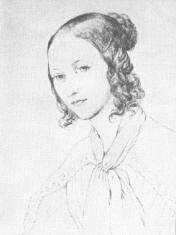
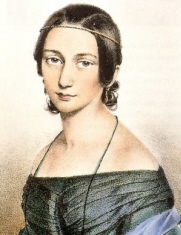
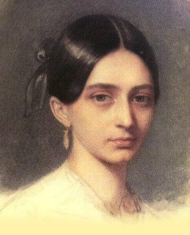
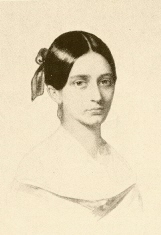
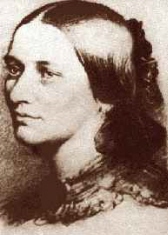
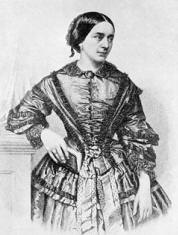
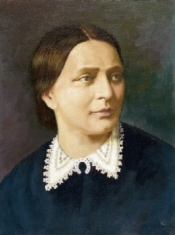
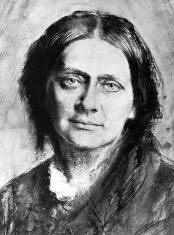
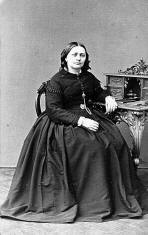
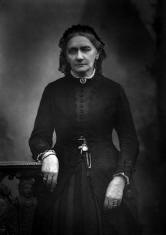
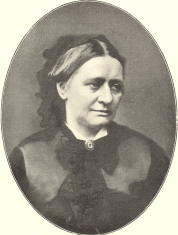
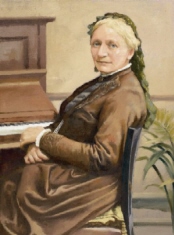
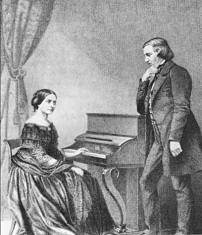
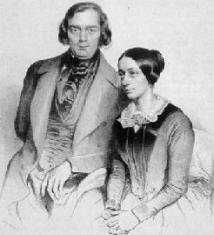
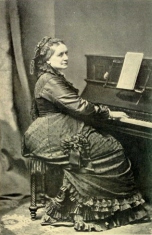
|
|
Source: Wikipedia Website
Contributed by Aryeh Oron (June 2007) |
|
Clara Wieck Schumann : Short Biography | Piano Transcriptions: Works | Recordings |
|
Links to other Sites |
|
Clara Schumann (Wikipedia)
Clara Schumann 1819-1896 (Comprehensive Website)
Clara Schumann - Brief Biography (Carol Traxler)
Clara Wieck Schumann - Biography (Rutgers) |
Essentials of Music - Composers: Clara Wieck Schumann
Schumann Clara Wieck (Maurice Abravanel)
Clara Schumann, Composer (DSO Kids)
Clara Wieck Schumann's Biography |
|
Bibliography |
|
Berthold Litzmann : Clara Schumann: An Artist's Life, page 13. (New York: Da Capo Press; 1979)
Thomas Sowell: The Einstein Syndrome: Bright Children Who Talk Late, pages = 29-60 (Basic Books; 2001)
Roger Kamien: Music: an appreciation (Mcgraw-Hill College; 3rd edition, 1997)
Joseph Machlis, Kristine Forney: The Enjoyment of Music. 8th edition (Norton: New York, 1999)
Nancy B. Reich: Clara Schumann, The Artist and The Woman (Cornell University Press, 1985) |
|
|